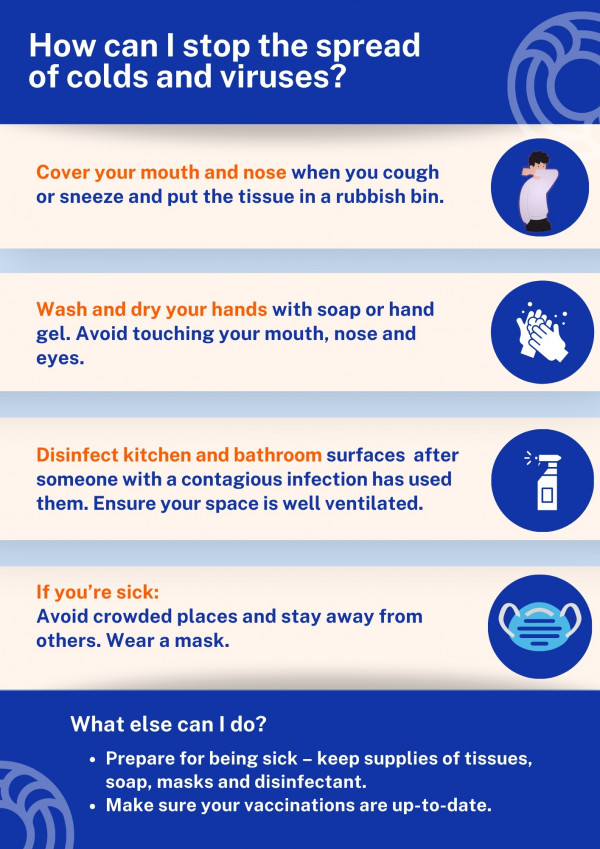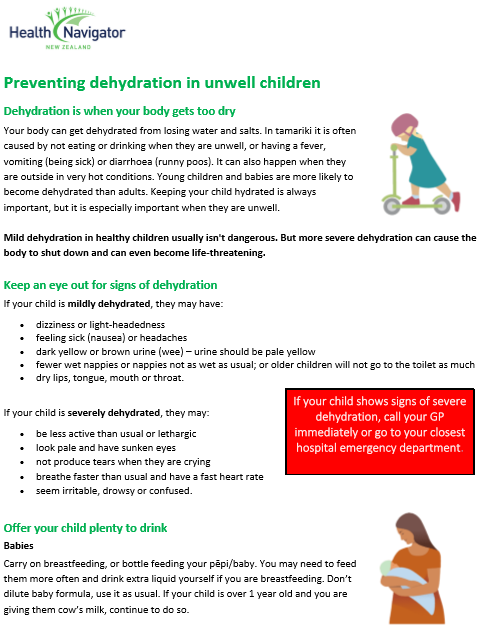Cough, runny nose, sore throat
Key points about cough, runny nose or sore throat
- Do you have a new cough, runny nose or sore throat?
- These symptoms are usually due to a viral infection such as a cold or the flu.
- Find out about what you can do to care for yourself at home and when to seek help.

 Image credit: Te Whatu Ora
Image credit: Te Whatu Ora
The most common cause of a new cough, sore throat or runny nose is a viral infection, such as a cold or the flu(external link), that lasts 1 to 2 weeks. However, these symptoms can also be the first signs of COVID-19(external link) infection, so it’s important to test for this.
If you have COVID-19 symptoms, such as fever, coughing, sore throat or difficulty breathing, do a rapid antigen test(external link) (RAT) to test for COVID-19. You can buy RATs from community pharmacies and retail stores such as supermarkets. If you test positive, don't go to a medical clinic without phoning first – the clinic will give you instructions so that you don’t infect other people. Find out what to do if you have COVID-19(external link). It’s recommended you isolate for at least 5 days even if you only have mild symptoms.
If you’re Māori or Pacific Peoples, especially if you’re between 3 and 35 years of age, you’re at increased risk of rheumatic fever(external link) from strep throat(external link). If your throat is sore you should see your healthcare provider who’ll do a throat swab. Strep throat is a sore throat caused by a bacterial infection so if you have a positive throat swab test you’ll be given antibiotics to treat the infection and prevent rheumatic fever.
Read more about other causes of sore throat in adults(external link) and sore throat in children(external link).
There are things you can do to care for yourself if you have a cold, flu or COVID-19.
- Rest at home so you don’t spread bugs and give your body time to recover
- Drink plenty of fluids, warm lemon and honey drinks or soups to avoid dehydration (note that honey isn't safe for children under 1 year old).
- If you have a sore throat, suck a teaspoon of honey or gargle with salt water. You can make salt water by mixing half a teaspoon of salt in a cup of warm water. Spit out the water after gargling. Adults can also try using a gargle, throat spray or pain-relief (anaesthetic) lozenges that you can get from your pharmacy.
- For a blocked or runny nose you can try a decongestant and saline nasal spray. Also try sleeping propped up on pillows.
- For a cough sip a lemon and honey drink or ask your pharmacist about cough lozenges or medicines that may be suitable for you. Cough medicine doesn’t cure a cough but may give you some relief. Read more about cough in children, cough in adults and cough medicines.
- If you have post-nasal drip (when mucus drips down from the back of your nose or sinuses into your throat), sleep propped up and you can also try saline rinses, decongestants or antihistamines.
- Use your inhaler if you have asthma.
- For aches and pains try paracetamol, ibuprofen OR cold and flu medicines. Ask your doctor or pharmacist what is safe for you. Use our paracetamol dose calculator(external link) to find the right dose of paracetmol for your child.
- Check doses carefully to make sure you don't double up as many cold and flu medicines contain paracetamol or ibuprofen.
- Avoid antibiotics as they can’t cure colds, flu or COVID-19 as these are caused by viruses.
- Avoid strenuous exercise such as running or swimming. In rare cases, viral infections can affect your heart – at any age.
Seek urgent medical advice if you or someone you’re caring for develops any of these danger symptoms:
- Difficulty breathing.
- Feeling faint, passing out.
- Drowsy, floppy or very difficult to wake up.
- Blueness around the mouth.
- Very pale and cold.
- Severe chest pain.
- Severe headache or neck pain, light hurting your eyes, rash.
- High fever (39°C or over), especially if you're pregnant.
- Unusual or high-pitched cry in a baby.
Call 111 urgently and ask for an ambulance.
Contact your healthcare provider, or call Healthline on 0800 611 116 for advice, if you:
- have a sore throat and are Māori or Pacific Peoples from 3 to 35 years of age, as you’re at increased risk of rheumatic fever(external link) from strep throat(external link)
- have a cough and you’re short of breath
- cough up blood
- are pregnant
- have diabetes or a health condition affecting your breathing, heart or immune system
- are 65 years of age or older
- are not getting better after a week
- are concerned or not sure what to do.
Do these things to avoid catching and spreading bugs.
- Wash your hands regularly for 20 seconds and dry them well.
- Cover your coughs with a tissue or cough into your elbow, then wash your hands.
- Throw used tissues into a rubbish bin.
- Don’t cough near others.
- Avoid touching your face.
- Don’t share cups, eating utensils or towels.
- Clean and disinfect surfaces often.
- Stay home if you are sick and avoid close contact with others.

Image credit: Healthify He Puna Waiora
Brochures
Got a cold or flu? Find out what to do brochure(external link) Health Promotion Agency, NZ & Healthify He Puna Waiora, NZ, 2020
Preventing dehydration in unwell children [PDF, 192 KB] Healthify He Puna Waiora, NZ, 2022
Virus action plan (adults)(external link) He Ako Hiringa, NZ te reo Māori(external link), Samoan(external link), Tongan(external link), Hindi(external link), Chinese (simplified)(external link)
Virus action plan (child over 6 months)(external link) He Ako Hiringa, NZ te reo Māori(external link), Samoan(external link), Tongan(external link), Hindi(external link), Chinese (simplified)(external link)
Brochures

Healthify He Puna Waiora, NZ, 2022

Health Promotion Agency, NZ & Healthify He Puna Waiora, NZ, 2020
Credits: Healthify editorial team. Healthify is brought to you by Health Navigator Charitable Trust.
Last reviewed:





